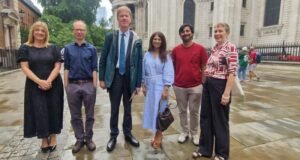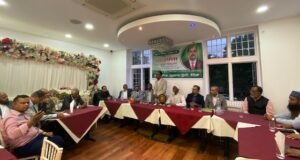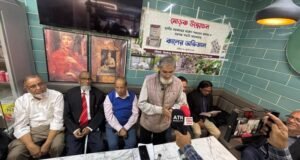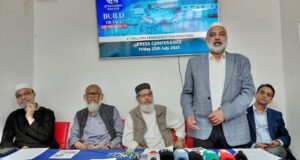
Ansar Ahmed Ullah:
Professor Abdul Momen, born on 22 August 1938 in Bangladesh, the then British India, died on 31st January 2020 in London, after a few years of suffering dementia. But this debilitating disease could never eclipse Abdul Momen’s life work in supporting racial equality and grass roots community activism.
Dr Eithne Nightingale first met Abdul Momen when she was appointed as Education Officer at Camden Committee for Community Relations in 1976. Abdul Momen worked for the Camden Committee for Community Relations as the Community Worker. They shared an office under the rafters in a four-storey building opposite Kings Cross station. She recalls before they got down to the serious business of the day, how he used to cite a line or two of William Blake, the subject of his PhD that he couldn’t complete. His work with the Bengali community in Camden was all too consuming.

While working at the Camden Committee for Community Relations Council he helped hundreds of people, especially Bengalis, from racist violence and with welfare benefits. Eric Jay, who was the CEO of Camden Committee for Community Relations Council during 1970s remembers that the Bangladeshi workers in the catering trade were suffering multiple deprivation without any recognition or support from the local authority, and Abdul Momen proved to be the ideal person to win the community’s trust and to argue forcefully and successfully for remedial action by the Council, the police and other authorities.
Abdul Momen worked from morning till night with the local Bengali community who, at that time, were living in dilapidated multi-occupational housing, working long hours with low pay in the catering industry in central London and faced racism in the workplace and on the streets. He worked tirelessly with Camden Council to ensure they had access to better housing. In 1984, following the death of a Bengali woman and her two children in a fire in appalling bed and breakfast accommodation, he organised an occupation of Camden Town Hall. One commentator described that when the fire started, no alarm rang. It had been switched off, the fire extinguishers were empty and the fire exits were blocked. It was night time but the stairs were in darkness because there were no bulbs in the lighting sockets. And in the single, cramped top floor room, where the cooker was next to the bed, Mrs Karim, a Bangladeshi woman, and her five year old son and three year old daughter died of suffocation. The conditions were disgraceful and outrageous.
Abdul Momen initiated one of the first Indian restaurant cooperatives, the ‘Last Days of the Raj’. One of the co-op members of Last Days of the Raj, Amin Ali went on to open a very successful restaurant the ‘Red Fort’. He worked with lawyers over the myriad of immigration issues faced by men trying to bring over families. Dr Eithne Nightingale mentions further that when she worked with him on lobbying the Inner London Education Authority to find places for children in schools, many waited for months, even years to access schooling after they arrived, particularly children housed in bed and breakfast accommodation. She added, ‘We worked with headteachers over the harassment children experienced on their way to and from school; on a training scheme that provided work experience for young people outside the catering and clothing industries’.
Momen was instrumental in setting up of the ‘Bengali Workers Action Group’ in 1976 which led to the establishment of Surma Community Centre on Robert Street, that today serves as a focal point of the local Camden Bengali community and a venue for a wide range of social, cultural and community events.
Abdul Momen went on to teach youth and community work at Avery Hill College, Greenwich University, and then London Metropolitan University, which is where I studied, inspiring generations of students. Unfortunately, by the time I had enrolled he had resigned from the university but would come in every now and then. I obviously knew him from his activism days. He was pleased to see me studying and would often talk and share his memory of community activism with me. He is respected by the British Bengali community and other individuals and organisations beyond Camden for, in the words of Rajonuddin Jalal former Deputy Leader of the London Borough of Tower Hamlets, “Abdul Momen was a pioneer of our time, who helped deprived communities build capacity for campaigns to achieve equality, freedom and Justice”.
Many people will be saddened by the passing of Abdul Momen but special thoughts are for his family at this time. Abdul Moen lived in Gospel Oak area. He leaves behind three children and two grandchildren. He will be missed for his humour, his gentleness, his intellect, his commitment to social & racial justice and his humanity. Many within the community are calling upon Camden Council to name a community hall, housing block or a road in honour of late Abdul Momen!
His funeral was held on 4 February 2020 at the historical Brick Lane Mosque attended by many of his former students & family members. Following his funeral, he was buried in the Garden of Peace cemetery in Hainault.
 Weekly Bangla Mirror | Bangla Mirror, Bangladeshi news in UK, bangla mirror news
Weekly Bangla Mirror | Bangla Mirror, Bangladeshi news in UK, bangla mirror news







